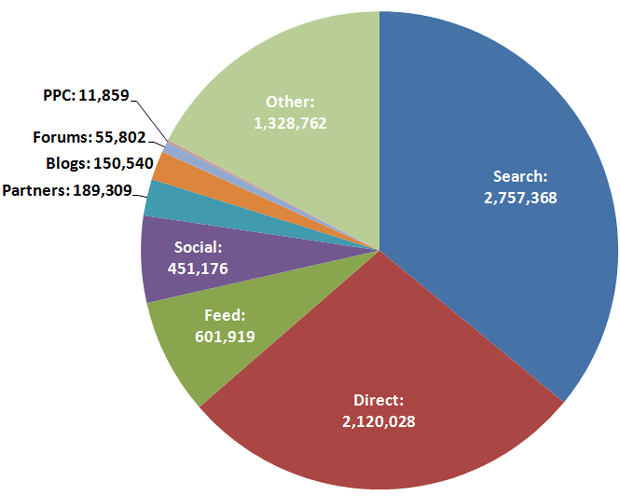
Traffic Source Diversity is Essential for Successful SEO
The author's views are entirely their own (excluding the unlikely event of hypnosis) and may not always reflect the views of Moz.
I recently created some custom filters in Google Analytics to illustrate SEOmoz's traffic over the past 12 months:
SEOmoz's Traffic Sources Distribution

_
Data from March 15, 2010 - March 14, 2011
Here's the breakdown in percentages:
- Search (Google, Yahoo!, Bing, Baidu, etc.): 36.0%
- Direct (Bookmark + Type-In): 27.7%
- Feed (RSS via Feedburner): 7.9%
- Social (Twitter, Facebook, Reddit, Hacker News, StumbleUpon): 5.9%
- Partners (Distilled, Open Site Explorer, WebsiteGrader): 2.5%
- Blogs (SELand, SERoundtable, AVC, etc.): 2.0%
- Forums (WebmasterWorld, Google Webmaster Groups, etc.): 0.7%
- PPC (AdWords): 0.2%
- Other (uncategorized + everything else): 17.3%
As SEOs, we know that search traffic has vulnerabilities and fluctuations that are out of our control. The recent examples of sites that were unintentionally affected in the the Farmer/Panda update is a good example, but there are hundreds of potential issues, both from our own efforts and those of others (the engines themselves, our competitors, etc.) that can affect things outside of large-scale algo updates.
We've also felt the search engines moving in a more "holistic" direction, and seeking features that "brands" have, but generic sites don't in order to reward the former in their rankings. I did a presentation on this topic at the recent Be-Wizard! San Marino event, included below:
It's my sense that increasing the diversity of sources is an excellent path for online marketers to take, especially at this junction, because:
- Search engines want to reward sites that "naturally" attract traffic from other sources - those who get clicks on the links that point to them, who have social media sharing happening aroud their content and who aren't simply a "farm" for search visits.
- The online world is diversifying at a much greater clip in the last 3 years than anytime since the mid-90's. Instead of consolidation, we're seeing expansion as sites like Reddit, StumbleUpon, Twitter, Facebook, Yelp, YouTube, etc. all expand their reach and newcomers like Foursquare, Path, Quora, StackExchange, Groupon, LivingSocial, and many others become substantive traffic drivers. Sites that can't play in these new ecosystems will likely lose out to their early-adopter-friendly competitors.
- No single source of traffic is wholly "safe," but a diversified portfolio has much less associated risk.
- Diversifying traffic sources means experimenting with new potential channels for traffic, and that means potentially finding sources that send great visits, links, citations, shares, etc.
- Getting to a new channel before a competitor can be key to owning mindshare and traffic from that source.
- Diversification makes it less likely that a road bump in any single channel can have a devasting impact on your overall business. One thing I'm very thankful for is that SEOmoz only gets ~30% of its traffic from Google. Should they ever (intentionally or unintentionally) alter our ability to perform, we won't be dead in the water (unlike many of our peers in similar spaces).
Of course, knowing what we have to do is the easy part. Executing on that is much more challenging. That's why, over the next 18 months, it's my goal to start investing more energy into research, case studies, content and, of course, software, to help. In order to win at SEO, we're going to need to win at ALL of inbound marketing, and luckily, the side effects are incredibly beneficial, too.




Comments
Please keep your comments TAGFEE by following the community etiquette
Comments are closed. Got a burning question? Head to our Q&A section to start a new conversation.